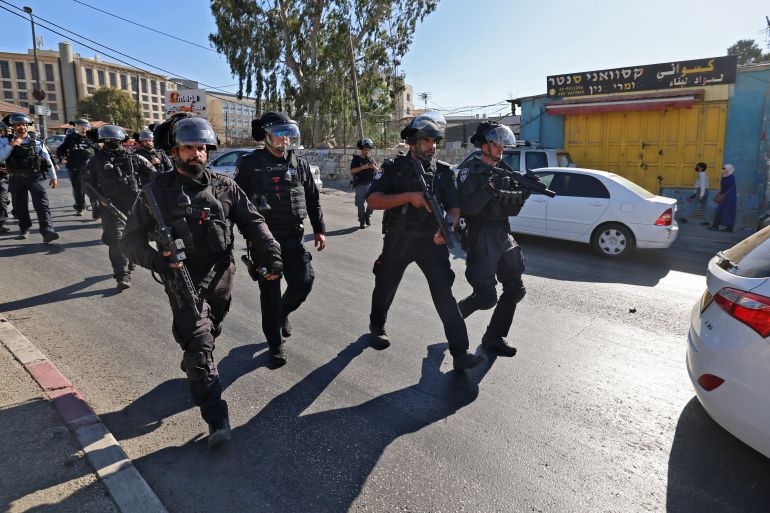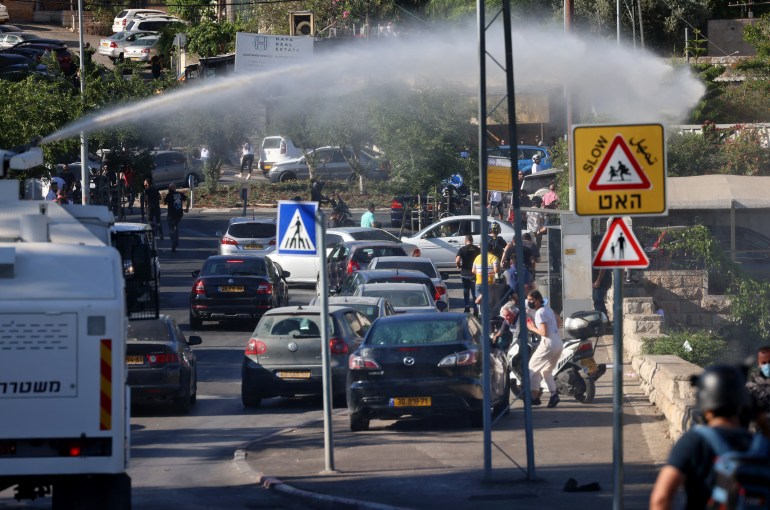Sheikh Jarrah is ‘under a siege,’ Palestinian residents say
Palestinians living in occupied East Jerusalem neighbourhood have been placed ‘under a siege’ by Israeli authorities, residents say.

Palestinians living in the flashpoint neighbourhood of Sheikh Jarrah in occupied East Jerusalem say they have been placed “under a siege” by Israeli authorities.
Recently Israeli police have been preventing non-residents from entering the neighbourhood, which has been closed off, Palestinian resident Abdelfatah Iskafi, 71, told Al Jazeera.
Keep reading
list of 4 itemsAre attitudes towards Palestine shifting in the US?
UN chief urges immediate ceasefire in Israel-Palestine conflict
The Frontline: Israel-Palestine
Palestinian residents have limited their movements and are mostly staying at home, since if they leave the neighbourhood Israeli authorities sometimes will not allow them to return, claiming they have orders it is a military zone, Iskafi said.
“Settlers are allowed to move freely. They move in groups of 20-25 together, armed,” Iskafi said, adding they taunt and try to provoke Palestinian residents.
“We don’t sleep at night because we are concerned about what these extremists might do.”
The IOF has unofficially declared Sheikh Jarrah a military zone (for Palestinians only ofc). Those who managed to get in are kicked out. Settlers on the other hand…. you should be able to finish the sentence by now. #SaveSheikhJarrah pic.twitter.com/PO2qxMyu3z
— Mohammed (@m7mdkurd) May 17, 2021
A demonstration is planned for Saturday at 5:00pm against the blockade imposed on the neighbourhood.
Tomorrow 5 pm, we are protesting the illegal blockade imposed on Sheikh Jarrah. #SaveSheikhJarrah pic.twitter.com/x9Ci51TQ6G
— Mohammed (@m7mdkurd) May 21, 2021
Earlier this month, Sheikh Jarrah was the site of demonstrations as dozens of Palestinians living there faced forced expulsion in a case filed against them by settler organisations.
Mass protests against their forced dispossession this month quickly spread across historic Palestine and caught the attention of international media.
An Israeli crackdown on protesters spread to Al-Aqsa Mosque, where Israeli security forces stormed the compound numerous times during the holy month of Ramadan, wounding hundreds of Muslim worshippers.
On May 9, under pressure, the Israeli high court delayed the ruling on the expulsion of the four Palestinian families. A new court date will be announced in 30 days, the court said.
But tensions remain high as Israeli fighter jets bombed the besieged Gaza Strip and Palestinian protesters have been shot dead in the occupied West Bank and in Israel.
On Sunday Israeli forces killed a Palestinian driver who crashed his car into a police roadblock in Sheikh Jarrah, injuring six officers.

Iskafi is from one of the Palestinian families facing expulsion and waiting for a final decision from the court. He said on Sunday night police locked the family in their house for the whole night until the next evening.
“They put three to four soldiers at the door of each of our houses to keep us locked inside. Whenever we tried to get out they said to us: ‘You stay inside or we will beat you.'”
On Tuesday, there was a large protest against the siege placed on the neighbourhood, Iskafi said.
“The confrontations were heavy and at least 36 [Palestinians] were injured. The same day we were as usual peacefully protesting in our neighbourhood when the police arrived and beat us.
“I was injured in my head. They don’t care, they target anyone even a 71-year-old man like me,” Iskafi said.
Palestinian writer Mohammed el-Kurd from Sheikh Jarrah posted on Twitter a video and photos on Tuesday showing Israeli police spraying streets with “skunk water … an intense, chemically manipulated liquid that sticks on your skin for a week if it came in direct contact”.
The neighborhood now reeks of the skunk water. This is the car they use to spray protesters—it’s an intense, chemically-manipulated liquid that sticks on your skin for a week if it came in direct contact. Allergic reactions to the skunks have been reported. #SaveSheikhJarrah pic.twitter.com/iMjnBa8Ypr
— Mohammed (@m7mdkurd) May 18, 2021
‘Suppress Palestinian mobilisation’
Israeli NGO Ir Amim said in a Wednesday statement for about two weeks Israeli police cordoned off the Kerem Al’ajoni section, or the eastern part of Sheikh Jarrah, where hundreds of Palestinians under threat of forced expulsion live.
A heavy presence of police and paramilitary forces blocks access to the area, it said.
Since May 14, the closure has intensified with entry of supporters of Palestinian residents banned because of “the so-called risk of clashes”, but these restrictions are not imposed on supporters of Jewish settlers living there, Ir Amim said.
“The closure of the neighbourhood is seen as an intentional brazen move by the Israeli authorities to suppress Palestinian mobilisation and deprive the residents of Sheikh Jarrah of the freedom of expression and the right to protest against their forced displacement,” it said.
Palestinian families are living inside “a cordoned-off military-like zone. They are subject to ongoing arbitrary harassment and aggressive police measures, marked by forced entry into homes and the use of stun grenades, skunk water, and rubber-tipped bullets against neighbourhood residents”.

Police often force residents to stay in their homes and hostilely remove those sitting outside, Ir Amim said, adding a soldier fired rubber-tipped rounds into a family’s house on Tuesday, severely wounding a 15-year-old girl inside.
The NGO said it sent an urgent letter to the police last week, demanding they lift the neighbourhood’s closure and stop “the hostile measures which lead to further incitement”, but no response has been received yet.
Palestinian resident Carmel Qasem told Al Jazeera police told his family if they left the neighbourhood they would not be allowed to return.
Their biggest concern is the checkpoint will become permanent at the entrance to the neighbourhood and police will keep conducting “security” checks on residents.
“They come to check our IDs and addresses even when we’re standing by our own house in the neighbourhood,” Qasem said.
‘Tension will continue’
While families await the court ruling, Iskafi said their current concern is with far-right “extremists” entering the neighbourhood, with the support of Member of Knesset Itamar Ben-Gvir and Jerusalem Deputy Mayor Aryeh King.
“As long as they are still coming to the neighbourhood, the tension will continue,” Iskafi said.
Israeli media reported last week Police Chief Kobi Shabtai told Prime Minister Benjamin Netanyahu that Ben-Gvir was responsible for adding fuel to the fire in occupied East Jerusalem, as well as in “mixed” cities in Israel proper that saw riots break out.
Earlier this month during a visit to Sheikh Jarrah, King, surrounded by settlers and Kahanists, mocked a Palestinian protester who had been previously shot in the lower back, saying “it’s a pity [the bullet] didn’t go in here” – pointing to his forehead.
In Sheikh Jarrah last night, Jerusalem Deputy Mayor Aryeh King was recorded telling Muhammad Abu Hummus, a Palestinian activist from East Jerusalem, that it's a "pity" he didn't get a bullet in his head.
The deputy fucking mayor of Jerusalem, everybody.
Video by @OrenZiv1985 pic.twitter.com/m2eEqSjv0r
— Edo Konrad (@edokonrad) May 7, 2021
‘The world is not listening’
Meanwhile, nearby at Al-Aqsa, Sheikh Omar al-Kiswani, director of the holy mosque, told Al Jazeera that Al-Aqsa has sustained damage amounting to about $282,000 due to “excessive force” used by Israeli forces during their violent raids in the compound earlier this month.
The occupying forces broke the door of a minaret in order to climb on top of the mosque, damaged eight windows from the Umayyad period to throw stun grenades and tear gas inside, and damaged all the doors of the Qibli mosque, al-Kiswani said.
Structures in various buildings in the compound need to be replaced. Israeli forces also stormed the athan (call to prayer) room and cut the cables, damaging the sound system including amplifiers and loudspeakers.
“The mosque yard was a battlefield; they used rubber bullets, live bullets, stun grenades and tear gas. You can see shrapnel of their weapons [left behind],” al-Kiswani said.
Dareen Jubeh reported from Sheikh Jarrah